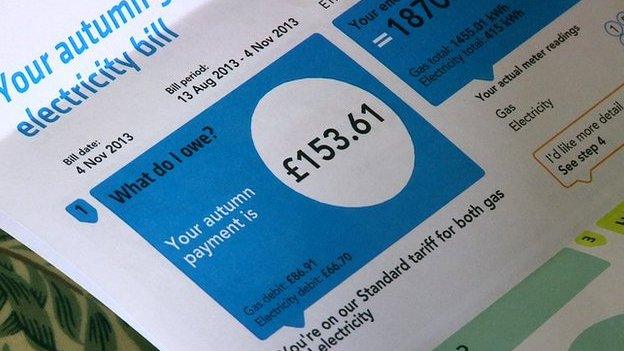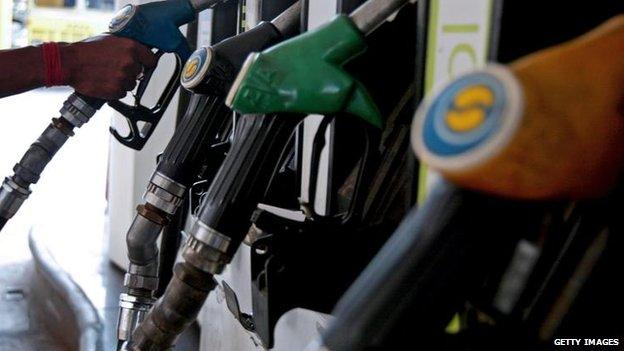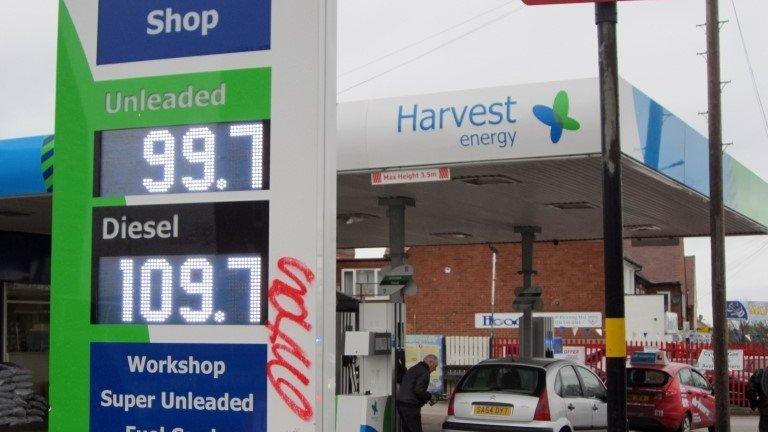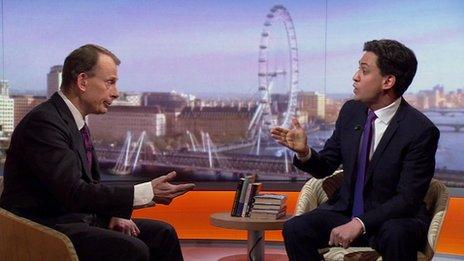Why aren't my energy bills coming down?
- Published

Behind the headlines about the oil price crash, here are three bits of the story I picked up in recording the Business Scotland programme this week.
One: if you think lower energy prices should be feeding through to lower bills for home heating and electricity, Ed Miliband has some explaining to do to you.
He promised to freeze bills for 17 months, at a time when rising bills were causing a lot of household budget pain.
What he didn't foresee was that wholesale prices could fall, and fall a long way. David Hunter, of Schneider Electric energy consultancy in Dunfermline, told me that gas prices have fallen 25%, in the period oil has fallen more than 50%.
He also pointed out that the "juice" of wholesale energy only accounts for around half of your utility bill, as there are other costs from distribution along with social and green levies.
Big Six
So one reason to explain why, among the Big Six energy utilities, only E.ON has lowered its gas price, is that the companies don't want to get caught out by an incoming Labour government.
Ed Miliband wanted to stop bills going up, but it seems that his policy is a contributing factor to ensuring they don't fall.
According to David Hunter, the policy may have been well-intentioned, but it has unintended consequences.
And that helps explain why the policy has changed in the past few days - from the promise of a energy price freeze to a price cap.
There was a spat about this between Lord (Michael) Forsyth and Labour energy spokesman Tom Greatrex on BBC Radio 4's The Week in Westminster.
The issue is partly about how energy companies have responded to the prospect of that price freeze. They were already heavily engaged in hedging against future price changes.
This is a nerve-wracking time for those on either side of hedges, including banks, as the price falls and those hedges unwind over the next few months.
Efficiency
We heard, for the Business Scotland programme, from Seth Kleinman, chief energy analyst with Citi Group in London, about his take on the crisis having much more to do with OPEC and American shale supply than about demand.
However, he highlighted energy efficiency as one big part of the story about demand for oil. What was once a strong link between economic growth and energy consumption has been decisively broken.
That is partly because the non-energy intensive service sector is often the engine of growth, but also that regulation linked to climate change measures is revolutionising the efficiency of the transport sector.
In other words, the latest generation of cars is delivering big big improvements in fuel consumption, and that's being driven by US emissions standards as much as European.

In emerging markets in Asia, Kleinman says the traffic sclerosis in fast-growing cities is putting a constraint on the prospect of another decade of continued growth in demand for transport fuel.
On the supply side of the market, the Citi analyst notes that shale-based supply from the USA falls away rapidly, creating the conditions for the price to rise again. If it gets back to $70, fracking of shale can quickly get re-started, and with that extra capacity, it should keep prices from rising further.
That's why the Citi analyst doesn't see any reason why the price should rise much above $70. If that's the new equilibrium price, it doesn't look good for a lot of UK offshore production.
Fracking
And what about UK onshore production? A lot of hope has been placed in tapping British shale gas, with the UK government seeking to make this an attractive place to invest.

There's no shortage of opposition from local and national environmentalists. Holyrood has been given the power to take its own path on planning permissions for fracking.
Professor Peter Strachan of Robert Gordon University has contributed to the BBC Radio Scotland programme a question that's been widely overlooked as the offshore industry faces such big challenges.
If the US shale fracking industry requires the oil price to be at least $60 per barrel, and up to $100 for some areas, then it's a fair guess that UK shale is going to cost at least as much.
Britain doesn't yet have the infrastructure to get onshore oil and gas to market in quantity. Building it up will take time and money. Until then, the costs would be high. So where, asks Peter Strachan, does this central strand of the UK government's energy policy now stand?
You can hear the latest Business Scotland programme on the BBC iPlayer and by podcast.
- Published12 January 2015

- Published11 January 2015
